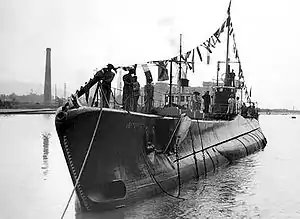SS Navemar
SS Navemar was a cargo steamship that was built in England in 1921, was Norwegian-owned until 1927 and then Spanish-owned for the rest of her career. An Italian submarine sank her in the Strait of Gibraltar in 1942.
| History | |
|---|---|
| Name |
|
| Owner |
|
| Port of registry |
|
| Builder | Armstrong, Whitworth & Co, Newcastle upon Tyne |
| Launched | 14 April 1921 |
| Completed | October 1921 |
| Identification |
|
| Fate | Sunk by torpedo in the Strait of Gibraltar, 23 January 1942 |
| General characteristics | |
| Type | Cargo ship |
| Tonnage | |
| Length | 407.1 ft (124.1 m) p/p |
| Beam | 53.8 ft (16.4 m) |
| Draught | 27.9 ft (8.5 m) |
| Depth | 30 ft 6 in (9.30 m) |
| Installed power | 548 NHP |
| Propulsion |
|
| Capacity | 28 passengers |
| Crew | 36 |
Navemar is notable for a voyage in 1941 in which she carried about 1,120 European Jewish refugees to the United States in overcrowded and unsanitary conditions.[1]
Building
Armstrong, Whitworth & Co of Newcastle upon Tyne, United Kingdom built the ship as Frogner for Fearnley and Eger of Oslo, Norway, completing her in October 1921.[2]
The ship was 407.1 ft (124.1 m) long between perpendiculars, had a beam of 58.3 ft (17.8 m) and a depth moulded of 30 ft 6 in (9.30 m). She had nine corrugated furnaces with a combined grate area of 183 square feet (17.0 m2) heating three single-ended boilers with a combined heating surface of 8,112 square feet (753.6 m2). Her boilers supplied steam at 180 lbf/in2 to a three-cylinder triple expansion steam engine of 548 NHP that drove a single screw.[2]
Career 1921–41
In 1927 Ybarra y Compania of Seville bought the ship and renamed her Cabo Mayor. In 1932 Compañía Española de Navegación Marítima bought her and renamed her Navemar.[3]
On 22 December 1932 Navemar collided with the French steamship Bernardin de St. Pierre at Marseille, Bouches-du-Rhône, France, and was beached.[4][5] She later was repaired and returned to service.
In 1937–38 Navemar was the subject of a court case in the United States between the Government of the Republic of Spain and the ship's crew, who were trying to prevent her from being requisitioned in the Spanish Civil War. The Supreme Court of the United States ruled in favour of the Spanish Government.[6]
Refugee voyage
In 1941, the American Jewish Joint Distribution Committee (known as "The Joint") were desperate to rescue Jewish refugees from Germany, Austria and Czechoslovakia escaping Nazi persecution. Many held US visas that were about to expire. The Joint's agents directed them to Seville, where the Navemar had been privately chartered to make the transatlantic crossing. Tickets for the few passenger cabins sold at exorbitant prices. The captain vacated his cabin and charged $2,000 to all who could fit themselves into the small space.[7] Bunks were fitted in the filthy cargo holds, which had previously carried coal.[8] Although attempts were made to clean the ship, there was too little time to complete the task.[9]
Navemar left Seville on 7 August 1941. She called at Lisbon in Portugal, where many of the visas were extended by the US Embassy.[10] After calling at Havana in Cuba she reached New York on 12 September 1941. Many of the passengers had contracted typhus[11] and six of them died in the five-week crossing.[12]

Subsequent career and fate
After her refugee voyage Navemar returned to general trade. On 23 January 1942 the Marcello-class Italian submarine Barbarigo torpedoed and sank her in the Strait of Gibraltar.[13][14]
References
- "National Affairs: S.S. NEVERMORE". Time. 22 September 1941. Archived from the original on September 3, 2010.
- Lloyd's Register, Steamers & Motorships (PDF). London: Lloyd's Register. 1941. Retrieved 20 May 2017.
- Swiggum, S; Kohli, M (4 July 2007). "Ybarra Line / Ybarra y Cia., Sevilla". The Ships List.
- "A collision near Marseilles". The Times. No. 46324. London. 23 December 1932. col G, p. 19.
- "Casualty reports". The Times. No. 46325. London. 24 December 1932. col F, p. 17.
-
 The full text of The Navemar Compania Espanola De Navegacion Maritima Sa v. The Navemar/Opinion of the Court at Wikisource
The full text of The Navemar Compania Espanola De Navegacion Maritima Sa v. The Navemar/Opinion of the Court at Wikisource - Agar 1960, p. 136.
- Seitel, Becky. "The Crossing". Jenny Fried Cohen. Birmingham Holocaust Education Center.
- "Jewish refugee ships: Troubled waters". From the Desk of Jeff King. Narrow Gate. 3 May 2004. Archived from the original on 2018-10-16. Retrieved 2021-06-16.
- Agar 1960, p. 137.
- Verbannte – Rare Book and Special Collections – LibGuides at University of Newcastle Library Archived 2011-08-20 at the Wayback Machine
- "Ernst Scheuer and Rosi Moses-Scheuer Collection". Center for Jewish History.
- Lettens, Jan; Vleggert, Nico. "SS Navemar (+1942)". Wrecksite.
- "Regio Sommergibile Barbarigo". Grupsom (in Italian). Gugliemo Lepre.
Sources
- Agar, Herbert (1960). The Saving Remnant: An Account Of Survival. New York: The Viking Press. p. 136.
External links
- "Search Results – Record View: navemar". Archives. American Jewish Joint Distribution Committee. archival holdings of deposit cards of passengers on Navemar
- Lange, Leonora. "Guide to the S.S. Navemar – Saul Sperling Collection". Leo Baeck Institute. Collection contains lawyer Saul Sperling's notes and correspondence on the suit brought by passengers against the owners of Navemar after she reached New York in September 1941.